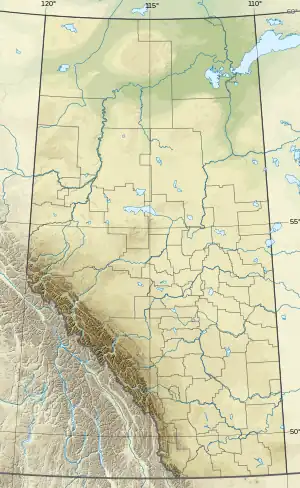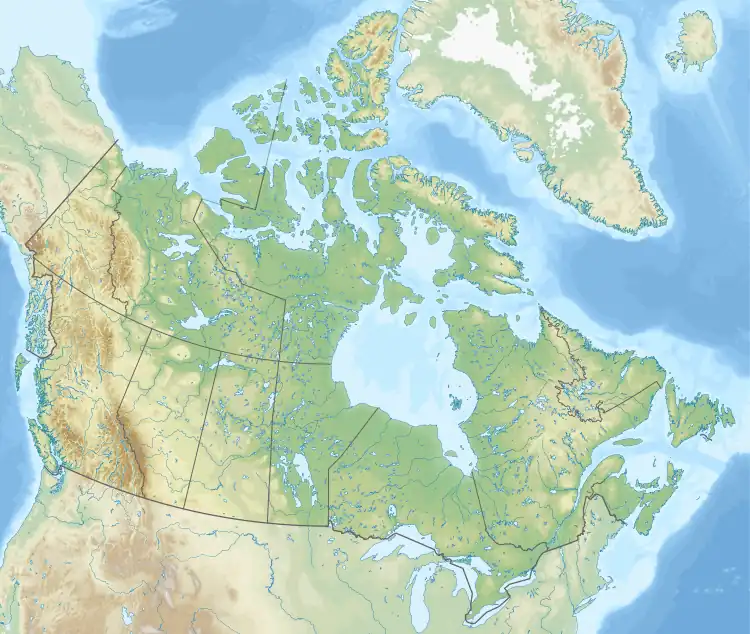Eaglesham | |
|---|---|
 Eaglesham Location of Eaglesham  Eaglesham Eaglesham (Canada) | |
| Coordinates: 55°46′57″N 117°53′00″W / 55.78250°N 117.88333°W | |
| Country | Canada |
| Province | Alberta |
| Region | Northern Alberta |
| Census division | 17 |
| Municipal district | Birch Hills County |
| Government | |
| • Type | Unincorporated |
| • Governing body | Birch Hills County Council |
| Area (2021)[1] | |
| • Land | 0.84 km2 (0.32 sq mi) |
| Population (2021)[1] | |
| • Total | 76 |
| • Density | 91/km2 (240/sq mi) |
| Time zone | UTC−07:00 (MST) |
| • Summer (DST) | UTC−06:00 (MDT) |
| Area code(s) | 780, 587, 825 |
Eaglesham (/ˈiːɡəlzəm/) is a hamlet in northern Alberta, Canada within Birch Hills County,[2] located 6 kilometres (3.7 mi) north of Highway 49, approximately 89 kilometres (55 mi) northeast of Grande Prairie.
The hamlet takes its name from Eaglesham in Scotland.[3]
Eaglesham is primarily a farming community. Eaglesham also has a small K-12 school with 80 students.[4]
Demographics
In the 2021 Census of Population conducted by Statistics Canada, Eaglesham had a population of 76 living in 45 of its 60 total private dwellings, a change of -18.3% from its 2016 population of 93. With a land area of 0.84 km2 (0.32 sq mi), it had a population density of 90.5/km2 (234.3/sq mi) in 2021.[1]
As a designated place in the 2016 Census of Population conducted by Statistics Canada, Eaglesham had a population of 93 living in 50 of its 60 total private dwellings, a change of -21.8% from its 2011 population of 119. With a land area of 0.84 km2 (0.32 sq mi), it had a population density of 110.7/km2 (286.7/sq mi) in 2016.[10]
See also
References
- 1 2 3 4 "Population and dwelling counts: Canada and designated places". Statistics Canada. February 9, 2022. Retrieved February 10, 2022.
- ↑ "Specialized and Rural Municipalities and Their Communities" (PDF). Alberta Municipal Affairs. January 12, 2022. Retrieved January 21, 2022.
- ↑ Place-names of Alberta. Ottawa: Geographic Board of Canada. 1928. p. 46.
- ↑ "Eaglesham School". Archived from the original on June 19, 2011. Retrieved June 8, 2011.
- ↑ "Table 3: Population for census divisions and subdivisions, 1971 and 1976". 1976 Census of Canada. Census Divisions and Subdivisions, Western Provinces and the Territories. Vol. Population: Geographic Distributions. Ottawa: Statistics Canada. 1977.
- ↑ "Table 2: Census Subdivisions in Alphabetical Order, Showing Population Rank, Canada, 1981". 1981 Census of Canada. Vol. Census subdivisions in decreasing population order. Ottawa: Statistics Canada. 1982. ISBN 0-660-51563-6.
- ↑ "Table 2: Population and Dwelling Counts, for Census Divisions and Census Subdivisions, 1986 and 1991 – 100% Data". 91 Census. Vol. Population and Dwelling Counts – Census Divisions and Census Subdivisions. Ottawa: Statistics Canada. 1992. pp. 100–108. ISBN 0-660-57115-3.
- ↑ "Population and Dwelling Counts, for Canada, Provinces and Territories, and Census Divisions, 2001 and 1996 Censuses – 100% Data (Alberta)". Statistics Canada. Retrieved May 25, 2019.
- ↑ "Population and dwelling counts, for Canada, provinces and territories, and census subdivisions (municipalities), 2006 and 2001 censuses – 100% data (Alberta)". Statistics Canada. January 6, 2010. Retrieved May 25, 2019.
- 1 2 "Population and dwelling counts, for Canada, provinces and territories, and designated places, 2016 and 2011 censuses – 100% data (Alberta)". Statistics Canada. February 8, 2017. Retrieved February 13, 2017.